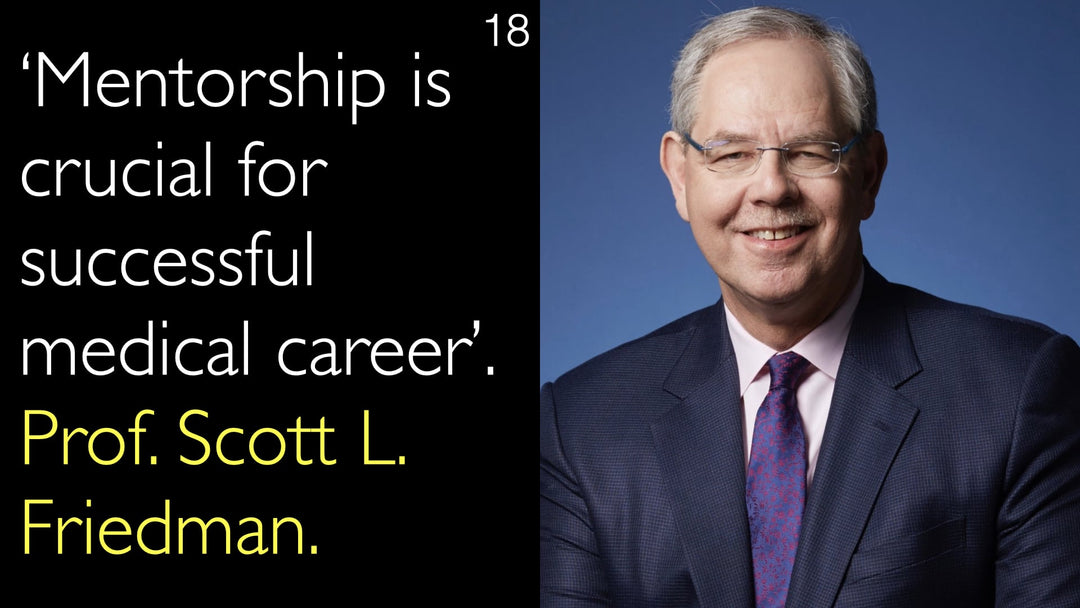Leading expert in liver disease and medical mentorship, Dr. Scott Friedman, MD, explains the profound importance of mentoring for a successful medical career. He details how effective guidance impacts trainees at all levels. Dr. Scott Friedman, MD, emphasizes that strong mentorship shapes the future of medical specialties. This ultimately benefits patient care through a well-trained next generation of physicians and scientists.
The Critical Role of Mentorship in Advancing a Medical Career
Jump To Section
- Importance of Medical Mentorship
- Impact on Trainees and Fellows
- Shaping Future Medical Specialties
- Benefits for Physician-Scientists
- Ultimate Impact on Patient Care
- Full Transcript
Importance of Medical Mentorship
Dr. Scott Friedman, MD, highlights mentorship as a cornerstone of a fulfilling medical career. He describes his own career as infinitely challenging and stimulating. Dr. Friedman published a key article on this subject in the journal Hepatology in 2015. In "The Masters Perspective," he outlined the fundamental principles of effective mentoring.
Impact on Trainees and Fellows
Mentorship has a profound positive impact on medical trainees at every stage. Dr. Scott Friedman, MD, states that this guidance is crucial for students, residents, and postdoctoral fellows. He also includes junior faculty as beneficiaries of strong mentorship. Dr. Friedman made mentoring a priority throughout his career to support their growth.
Shaping Future Medical Specialties
Effective mentorship is vital for influencing the future direction of medical specialties. Dr. Scott Friedman, MD, believes that guiding the next generation is an essential professional duty. He notes that new professionals stand on the shoulders of those who came before them. This continuous cycle of learning and teaching ensures specialty advancement.
Benefits for Physician-Scientists
Mentorship is particularly important for nurturing physician-scientists. Dr. Scott Friedman, MD, emphasizes that good mentors help bridge clinical practice and research. This support system is key to developing the next wave of medical innovators. The guidance helps them navigate the complexities of a dual-focused career.
Ultimate Impact on Patient Care
The ultimate beneficiary of strong medical mentorship is the patient. Dr. Scott Friedman, MD, connects effective training directly to improved patient outcomes. By cultivating skilled and knowledgeable physicians, mentorship elevates the standard of care. Dr. Anton Titov, MD, agrees that this contribution makes a significant difference in the world of medicine, particularly in liver disease.
Full Transcript
Dr. Anton Titov, MD: Professor Friedman, is there anything in your personal interest, your philosophy, and your life experience and wisdom that you'd like to share with our viewers?
Dr. Scott Friedman, MD: I've been blessed by having a rich career that is infinitely challenging and stimulating, and from which I've continued to grow. I had the privilege of writing a piece called The Masters Perspective for our liver specialty journal called Hepatology.
I wrote that piece in 2015, and one of the things I emphasized there was how profoundly important mentoring is. I would say in terms of my own personal philosophy, I've always been acutely aware of how important and what a positive impact I can make on my trainees—whether they're students, residents, postdocs, fellows, even faculty—by learning how to mentor and making it a priority.
I've outlined in that article in 2015 the many ways that mentoring can be effective and why it's so important in influencing the future of our specialty, our physician-scientists, and our trainees. Ultimately, that will benefit our patients.
Dr. Anton Titov, MD: That is certainly a key message, because it also helps to train the next generation of professionals who continue to stand on the shoulders of giants, such as you are.
Dr. Scott Friedman, MD: Thank you. I never considered myself a giant; I'm just pleased I can make a contribution and make a small difference in the world, at least as far as liver disease is concerned. I've been very lucky.
Dr. Anton Titov, MD: Thank you, Professor Friedman, for this conversation. We hope to come back to you in the future to hear more exciting news about liver disease research, and thank you for your research and clinical work.
Dr. Scott Friedman, MD: It was my pleasure, and I'd be delighted to come back anytime.




